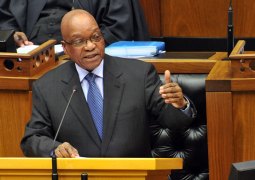
President Jacob Zuma used the occasion of the 2017/18 Budget Vote debate of The Presidency to indicate the intervention which the government has made as a gesture of its commitment to an economic transformation that impacts on the historically marginalised communities.
Delivering his 2017 Budget Vote speech in the National Assembly at Parliament, President Zuma said the government is busy driving a programme that revitalises township and rural enterprises as part of its National Informal Business Upliftment Strategy.
He said the government is making notable headway as it provides support to deserving informal businesses so that they graduate into formal small businesses. “If we have one million small businesses, and each employs one or two people, we would have created over one million jobs. This is how important investment into small business development is,” said President Zuma.
President Zuma told Members of Parliament (MPs) that in January of this year, the National Treasury gazetted new regulations in pursuit of preferential procurement by means of which 30% of public procurement will be made available to small businesses and cooperatives. “This will provide a market for the small business sector,” he said.
He said key support to small businesses must also include ensuring that they are not strangled by government regulations or red tape. “We also reiterate that government departments in all three spheres must also pay SMMEs (small, micro and medium-sized enterprises) on time, as directed when they submit legitimate invoices. These are some of the interventions that will make transformation a reality for our people,” he said.
With regard to the levelling of the playing field, Mr Zuma said the Black Economic Empowerment Advisory Council advises The Presidency and government on Broad-Based Black Economic Empowerment interventions. According to him, progress is being made in fighting fronting through the Broad-Based Black Economic Empowerment Commission, as such practices reverse the gains of transformation.
He said in the State of the Nation Address he gave prominence to the imperative of radical socio-economic transformation. “Our interventions are aimed at facilitating ownership and management of enterprises and productive assets by black people, workers, cooperatives and other collective enterprises.”
He said as the government seeks to radically transform the economy, “we need to be mindful of the structural challenges as the South African economy continues to be driven by consumption, global demand for mineral commodities and a very narrow productive base with few large companies that control the entire value chain”.
On the education of young people, President Zuma said his government spends the highest share of its budget on young people through education and skills development. “Government is doing as much as possible to support children of the poor and the working class to obtain higher education,” he said.
He said the government paid for the fee increase capped at 8% for all qualifying registered students with a gross combined family income up R600 000 a year for the 2017 academic year.
This is, according to him, a grant which covers the increases for tuition fees and official accommodation, and will not have to be repaid by qualifying students. “Government also made arrangements through the National Student Financial Aid Scheme (NSFAS) to pay the registration fees for all NSFAS-funded students as an upfront payment to universities and TVET (Technical and Vocational Education and Training) colleges in January each year”
President Zuma told MPs that other matters that his government is attending to relate to the public discourse about what has been termed state capture. “Let me place it on record that there is no opposition from either the government or The Presidency to calls for a commission of inquiry into the said 'state capture'. We fully support an inquiry as it will help to uncover the facts and remove rumours about the extent of state capture.”
He said what has caused a delay is the manner in which the former Public Protector directed that the inquiry should be done, which infringes on the powers of the President of the Republic. “If this is left unattended, it would cause problems even for future Heads of State as it sets a wrong precedent,” he said.
Also participating in the debate, the veteran National Assembly MP Prince Mangosuthu Buthelezi of the Inkatha Freedom Party, told President Zuma that the government is delaying the implementation of the National Development Plan (NDP) which according to him, was meant to grow the South African economy. He said the NDP was meant to ensure, among other things, the reduction of unemployment, poverty and inequality. But he said all these problems are increasing on a daily basis.
According to Prince Buthelezi, the longer the implementation of the NDP is delayed, the more the socio-economic problems for which it was crafted to deal with continue deepening while the NDP gathers dust on the shelves of the government. Prince Buthelezi said had the NDP been properly implemented, it would leave a great legacy for President Zuma.
Prince Buthelezi also reiterated the concern he said he always raised in the past. Budget Vote debates on The Presidency, that there is no Parliamentary Committee responsible for an oversight on The Presidency. He said oversight is a basic necessity on the use of public resources. “We have not had the benefit of interrogating the accounting officer as we do with any other budget. Why not?” asked Prince Buthelezi. He said “with a President so adept at avoiding accountability, surely oversight is necessity”.
The Chairperson of the Standing Committee on Public Accounts Mr Themba Godi, who also spoke during The Presidency Budget Vote debate, said the South African economy is facing serious problems that include downgrades by ratings agencies, yet irregular and fruitless expenditure is ballooning in most government departments. “The money must be used for the right reasons and right things,” said Mr Godi.
He told President Zuma that the accruals amounted to R29m in the last financial year. “Fight corruption beyond words, Mr President,” stressed Mr Godi.
By Mava Lukani
1 June 2017

